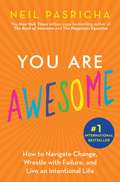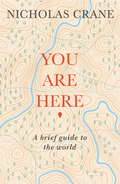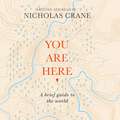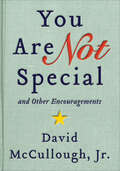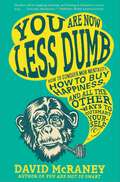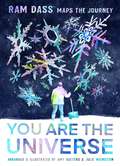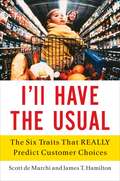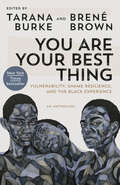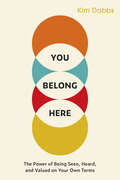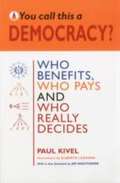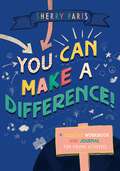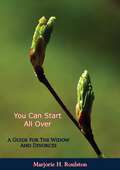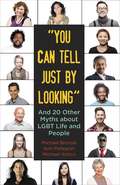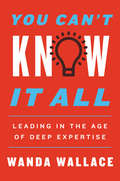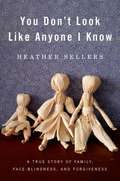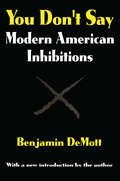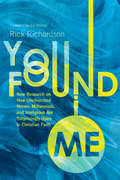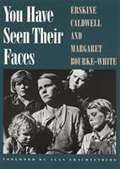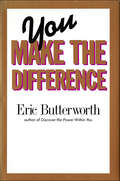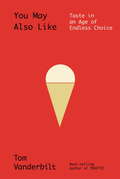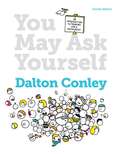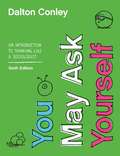- Table View
- List View
You Are Awesome: How to Navigate Change, Wrestle with Failure, and Live an Intentional Life (The\book Of Awesome Ser.)
by Neil PasrichaFrom Neil Pasricha—New York Times, million-copy bestselling author of The Book of Awesome series and The Happiness Equation, thought leader for the next generation, and one of the most popular TED speakers in the world—comes a revelatory and inspiring book that will change the way we view failure and help us build resilience.Why is life getting harder instead of easier? How do I get back up after life knocks me down? And how do I grow stronger and live more intentionally? What happened to famines? Great Depressions? Plagues? For most of us, these are distant memories. We&’re living in an era with highest-ever rates of longevity, education, and wealth. Cars drive us home as our phones entertain us before we arrive to food delivered to the front door. We have it all! But there&’s just one side effect. We no longer have the tools to handle failure...or even perceived failure. When we fall, we lie on the sidewalk crying. When we spill, we splatter. When we crack, we shatter. We are turning into an army of porcelain dolls. A rude email from the boss means calling in sick. Only two likes on our post means we don&’t have friends. Cell phones show us we&’re never good enough. Yesterday&’s butterflies are tomorrow&’s panic attacks. Record numbers of students have clinical anxiety. And what about depression, loneliness, and suicide? All rising! What do we desperately need to learn? RESILIENCE. And we need to learn it fast. Read You Are Awesome to learn: —The single word that keeps your options open after failure —Why you need to have more one-night stands —What every commencement speech gets wrong —3 ways to dramatically accelerate your ability to learn and adapt —The 2-minute morning practice that helps eliminate worry —Why you need an Untouchable Day (and how to get one) And much, much more... Because the truth is, you really are awesome.
You Are Here: A Brief Guide to the World
by Nicholas CraneOne word binds us all: geography. We are all geographers, human beings who care about the places we think of as 'home' - our habitat. And yet we have lost touch with the connection between our actions and the state of the planet that we all share. We need a new narrative that restores the connections between humanity and the Earth. We are being confronted by a daily barrage of geographical stories on climate change, geopolitics, population growth, migration, dwindling resources, polluted oceans and natural hazards. These are planetary concerns affecting all people and all places. They are challenges which can be addressed through geography.In this short but powerful book, Nicholas Crane makes the compelling case that never has geography been so important. On this finite orb, with its battered habitat, sustained in dark space by a thin, life-giving atmosphere, we have reached a point in our collective geographical journey where knowledge is the best guarantor of the future.[NOTE: published in hardback as YOU ARE HERE]
You Are Here: A Brief Guide to the World
by Nicholas CraneOne word binds us all: geography. We are all geographers, human beings who care about the places we think of as 'home' - our habitat. And yet we have lost touch with the connection between our actions and the state of the planet that we all share. We need a new narrative that restores the connections between humanity and the Earth. We are being confronted by a daily barrage of geographical stories on climate change, geopolitics, population growth, migration, dwindling resources, polluted oceans and natural hazards. These are planetary concerns affecting all people and all places. They are challenges which can be addressed through geography.In this short but powerful book, Nicholas Crane makes the compelling case that never has geography been so important. On this finite orb, with its battered habitat, sustained in dark space by a thin, life-giving atmosphere, we have reached a point in our collective geographical journey where knowledge is the best guarantor of the future.[NOTE: published in hardback as YOU ARE HERE]
You Are Here: A Brief Guide to the World
by Nicholas CraneOne word binds us all: geography. We are all geographers, human beings who care about the places we think of as 'home' - our habitat. And yet we have lost touch with the connection between our actions and the state of the planet that we all share. We need a new myth, a new narrative that restores the connections between humanity and the Earth.We are being confronted by a daily barrage of geographical stories on climate change, geopolitics, population growth, migration, dwindling resources, polluted oceans and natural hazards. These are planetary concerns affecting all people and all places. They are geographical challenges which can be addressed through geography.In this distillation of a lifetime's work, Nicholas Crane makes the compelling case that never has geography been so important. On this finite orb, with its battered habitat, sustained in dark space by a thin, life-giving atmosphere, we have reached a point in our collective geographical journey where knowledge is the best guarantor of the future.Written and read by Nicholas Crane(p) Orion Publishing Group 2018
You Are Not Special: … And Other Encouragements
by David McCullough Jr.A profound expansion of David McCullough, Jr.'s popular commencement speech—a call to arms against a prevailing, narrow, conception of success viewed by millions on YouTube—You Are (Not) Special is a love letter to students and parents as well as a guide to a truly fulfilling, happy life.Children today, says David McCullough—high school English teacher, father of four, and son and namesake of the famous historian—are being encouraged to sacrifice passionate engagement with life for specious notions of success. The intense pressure to excel discourages kids from taking chances, failing, and learning empathy and self-confidence from those failures.In You Are (Not) Special, McCullough elaborates on his now-famous speech exploring how, for what purpose, and for whose sake, we're raising our kids. With wry, affectionate humor, McCullough takes on hovering parents, ineffectual schools, professional college prep, electronic distractions, club sports, and generally the manifestations, and the applications and consequences of privilege. By acknowledging that the world is indifferent to them, McCullough takes pressure off of students to be extraordinary achievers and instead exhorts them to roll up their sleeves and do something useful with their advantages.
You Are Now Less Dumb: How to Conquer Mob Mentality, How to Buy Happiness, and All the Other Ways to Outsmart Yourself
by David McraneyThe author of the bestselling You Are Not So Smart shares more discoveries about self-delusion and irrational thinking, and gives readers a fighting chance at outsmarting their not-so-smart brains David McRaney’s first book, You Are Not So Smart, evolved from his wildly popular blog of the same name. A mix of popular psychology and trivia, McRaney’s insights have struck a chord with thousands, and his blog--and now podcasts and videos--have become an Internet phenomenon. Like You Are Not So Smart, You Are Now Less Dumb is grounded in the idea that we all believe ourselves to be objective observers of reality--except we’re not. But that’s okay, because our delusions keep us sane. Expanding on this premise, McRaney provides eye-opening analyses of fifteen more ways we fool ourselves every day, including: The Misattribution of Arousal (Environmental factors have a greater affect on our emotional arousal than the person right in front of us) Sunk Cost Fallacy (We will engage in something we don’t enjoy just to make the time or money already invested "worth it”) Deindividuation (Despite our best intentions, we practically disappear when subsumed by a mob mentality) McRaney also reveals the true price of happiness, why Benjamin Franklin was such a badass, and how to avoid falling for our own lies. This smart and highly entertaining book will be wowing readers for years to come. .
You Are The Ref: The Ultimate Illustrated Guide To The Laws Of Football
by Keith HackettDo you think you know the laws of football better than the officials?Could you be the man in black and make the right decisions?The ultimate footie quiz book is back with 300 dilemmas for you to solve!*Test your knowledge of the game with You Are The Ref, featuring illustrations from legendary artist Paul Trevillion's famous series. With expert text from the referees' referee Keith Hackett and an array of bizarre and entertaining scenarios for you to adjudicate on, this is an engrossing and entertaining read. Includes a special in-depth section on the controversial rules around the VAR system and questions covering everything from mid-game bust-ups and unexpected intrusions on the pitch to bitter disputes about penalties, these sporting conundrums will give even the biggest football fan a run for their money.
You Are the Universe: Ram Dass Maps the Journey
by Amy BuetensYou Are the Universe is an impactful guidebook, chronicling the unconventional journey and self-discovery of Ram Dass, one of the world&’s most beloved spiritual teachers.Sourced from five decades of recordings, Ram Dass shares his life story and transformative teachings in his own words with honesty and humor. He offers teens and adults of all ages life-altering inspiration for understanding universal truths, navigating their unique paths with compassion and awareness, and living a meaningful life. Vibrant hand-drawn and water-colored images illustrate Ram Dass&’s captivating story of transformation. You Are the Universe offers an accessible perspective on our world through Ram Dass&’s eyes, and explores timeless answers for today&’s most urgent questions. EXPERT GUIDANCE: Psychologist and spiritual teacher Ram Dass dedicated his life to educating others on the keys to spiritual fulfillment and happiness, drawing wisdom from a lifetime of experience. STRENGTHEN THE MIND AND THE SOUL: Ram Dass offers advice for teens on how to approach anxiety, engage in social justice, and find their path through the example of his experiences and wisdom. GORGEOUS ILLUSTRATED NOVEL: With beautiful watercolor illustrations, this book is a perfect gift for both those familiar with Ram Dass's teachings and those new to his philosophy. INTRODUCTION TO SPIRITUALITY: Sourced from the archive of Ram Dass&’s recordings, You Are the Universe explores his most vital teachings and introduces young people to spirituality in an easy to read and approachable way. A MUST-READ PREQUEL: You Are the Universe sets the stage for Ram Dass&’s iconic spiritual growth manifesto Be Here Now.
You Are What You Choose
by James T. Hamilton Scott De MarchiThe hidden patterns behind the way we make decisions Several recent books, from Blink to Freakonomics to Predictably Irrational, have examined how people make choices. But none explain why different people have such different styles of decision making--and why those styles seem consistent across many contexts. For instance, why is a gambler always a gambler, whether at work, on the highway, or in a voting booth? Scott de Marchi and James T. Hamilton present a new theory about how we decide, based on an extensive survey of more than thirty thousand subjects. They show that each of us possesses six core traits that shape every decision, from what to have for lunch to where to invest. We go with "the usual" way of deciding whenever there's a trade-off between current and future happiness, when facing the risk of a bad outcome, or when a choice might hurt other people. We're also consistent about how much information we want and how much we care about the opinions of others. Readers can determine their own decision-making profile with a test in the book. Once they understand the six core traits, they'll have a big advantage in their marketing campaigns, management strategies, investments, and many other contexts.
You Are Your Best Thing: Vulnerability, Shame Resilience, and the Black Experience
by Brené Brown Tarana BurkeTarana Burke and Dr. Brené Brown bring together a dynamic group of Black writers, organizers, artists, academics, and cultural figures to discuss the topics the two have dedicated their lives to understanding and teaching: vulnerability and shame resilience. <P><P>Contributions by Kiese Laymon, Imani Perry, Laverne Cox, Jason Reynolds, Austin Channing Brown, and more <P><P>It started as a text between two friends. <P><P>Tarana Burke, founder of the ‘me too.’ Movement, texted researcher and writer Brené Brown to see if she was free to jump on a call. Brené assumed that Tarana wanted to talk about wallpaper. They had been trading home decorating inspiration boards in their last text conversation so Brené started scrolling to find her latest Pinterest pictures when the phone rang. <P>But it was immediately clear to Brené that the conversation wasn’t going to be about wallpaper. Tarana’s hello was serious and she hesitated for a bit before saying, “Brené, you know your work affected me so deeply, but as a Black woman, I’ve sometimes had to feel like I have to contort myself to fit into some of your words. The core of it rings so true for me, but the application has been harder.” <P><P>Brené replied, “I’m so glad we’re talking about this. It makes sense to me. Especially in terms of vulnerability. How do you take the armor off in a country where you’re not physically or emotionally safe?” <P><P>Long pause. <P><P>“That’s why I’m calling,” said Tarana. “What do you think about working together on a book about the Black experience with vulnerability and shame resilience?”There was no hesitation. <P><P>Burke and Brown are the perfect pair to usher in this stark, potent collection of essays on Black shame and healing. Along with the anthology contributors, they create a space to recognize and process the trauma of white supremacy, a space to be vulnerable and affirm the fullness of Black love and Black life. <P><P><b>A New York Times Best Seller</b>
You Belong Here: The Power of Being Seen, Heard, and Valued on Your Own Terms
by Kim DabbsIn a world overcrowded with labels, don't allow your identity to be defined by other people. Learn how to take back your power, choose to feed the aspects of your identity that serve you, and let go of those that don't.Everyone feels like an outsider at some point in their life-when we walk into a room and think to ourselves, I don't belong here. To avoid these feelings of exclusion, many of us hide our authentic selves and allow others to define our identity.You Belong Here offers a new framework that allows each of us to define how we want to be seen, heard, and valued on our own terms so we feel a sense of belonging in any situation. Further, it serves as a launchpad for organizational leaders and culture builders to create safe spaces for individuals to show up as their authentic selves.Readers will explore our four identities:Our Lived Identity is made up of the aspects of our identity we inherit when we are born into the world.Our Learned Identity includes the parts of our identity that we've chosen or claimed as we make our way through the world.Our Lingering Identity is the identity we default to when we feel like an outsider and fall back into as a survival mechanism.Our Loved Identity is where we find our authentic selves and see ourselves through a lens of empowerment.In the journey to understand our past experiences and how society has established barriers to entry, we can design our own future, rooted in our Loved Identity. We learn to rewrite the stories that aren't serving us and embrace the ones that do. Rather than look for a seat at someone else's table, we find the tools to build our own. When we fully leverage this and live with authenticity and purpose, we can be seen, heard, and valued in a way that gives us a sense of belonging at home, at work, and in society. Belonging is realized when we understand everyone is an outsider and it's the power to create space for those differences that unite us all.
You Call This a Democracy?: Who Benefits, Who Pays, Who Really Decides?
by Paul KivelA penetrating look at the U. S. ruling class - a rich and powerful portion of the population who own tremendous amounts of wealth and who benefit from the way that decisions get made in this country. A look as well at an even smaller group, the power elite - 7,000 to 10,000 (predominately) white men - who make many of the decisions that affect our everyday lives. Most of the time they decide, they and the ruling class benefit, and we pay in our wages, our taxes, our health, the quality of our housing, and often with our lives. The book is carefully researched and referenced, and filled with numerous examples and illustrations. It is an indispensable resource for every person concerned about the undemocratic concentration of wealth and power in our society. Book jacket.
You Can Make a Difference!: A Creative Workbook and Journal for Young Activists
by Sherry ParisPacked with fun activities for self-reflection and development, this creative workbook is the ultimate toolkit for all young activists looking to make a difference and create change. Each chapter includes voices from inspiring young game changers to encourage readers to channel their passion for social justice into positive action. Focusing on identity, discrimination and oppression, it offers the space to explore new ideas, self-reflect and expand awareness of the systems underpinning injustice. Chapters engage with a range of social justice and identity issues, including race, gender, sexual orientation and disability, providing the tools needed to facilitate and encourage personal growth. Through creative art activities, journal prompts, interviews and more, this workbook will inspire, engage and empower you to realize your own social justice project and put it into action.
You Can Start All Over: A Guide For The Widow And Divorcee
by Marjorie H. Roulston Marjorie HillisSeminal early self-help book from renowned author Marjorie H. Roulston, who had a varied life from minister’s daughter to fashion journalist to millionaire’s wife to widow.“THE TITLE of this book, You Can Start All Over, isn’t something dreamed up to sugar-coat an easy, overoptimistic confidence. It is the expression of a strong conviction. I believe that when life brings a devastating change, leaving one alone and desolate, one can start all over. For I have done just that, three different times, two of them for bitterly unhappy reasons.Some people never have to. I frequently meet women, and not always very young ones, who state that they are living in the same houses in which they were born and married. Not long ago, I had occasion to send flowers to the funeral of a woman in her eighties who had never lost her husband or child, had lived along at about the same financial level from the cradle to the grave, and many of whose girlhood friends were sitting right there in the front pews. Nobody seemed to think it remarkable. Nobody, that is, but me.”
"You Can Tell Just By Looking": And 20 Other Myths about LGBT Life and People (Myths Made in America #9)
by Michael Bronski Ann Pellegrini Michael AmicoBreaks down the most commonly held misconceptions about lesbian, gay, bisexual, and transgender people and their lives In "You Can Tell Just by Looking" three scholars and activists come together to unpack enduring, popular, and deeply held myths about lesbian, gay, bisexual, and transgender people, culture, and life in America. Myths, such as "All Religions Condemn Homosexuality" and "Transgender People Are Mentally Ill," have been used to justify discrimination and oppression of LGBT people. Others, such as "Homosexuals Are Born That Way," have been embraced by LGBT communities and their allies. In discussing and dispelling these myths--including gay-positive ones--the authors challenge readers to question their own beliefs and to grapple with the complexities of what it means to be queer in the broadest social, political, and cultural sense.From the Trade Paperback edition.
You Can't Know It All: Leading in the Age of Deep Expertise
by Wanda T. WallaceToday’s organizations are packed full of experts in every area from marketing to risk to sales to IT. Many of these people are also leaders, heading teams or large departments. They are followed because they know more than the rest of their group. They are followed because of their credibility as experts. The toughest transition in business comes when expert leaders are asked to move beyond their expertise and lead a less homogenous group. Suddenly, experts face a new set of problems. They struggle to gain basic competence in dozens of areas without having to become the expert in every aspect. In Wanda Wallace’s experience, this move—from expert leader to a broader kind of authority—requires a new mindset about how to lead.Wallace explains what few people understand—how to add value as a leader when you’re dealing with an ever growing set of responsibilities over which you have little detailed knowledge. The work you do and the way you interact with people must also change. Managing now requires a light touch and a different approach to delegation. Above all, managing is about recognizing that while you may not do all the work of your team, you must enable the team to do the work. In this world, trust becomes essential.In You Can’t Know It All, Wallace presents the coaching model she has developed to address the challenges of this transition. She offers strategies for individuals to navigate their new roles and learn to combine their expertise with their leadership responsibilities. She gives essential advice on the fundamental change in mind-set that this requires. This invaluable handbook offers novice and experienced managers alike insights into their own careers, explains why their star performers may suddenly be floundering, and provides essential tools for guiding development.
You Don't Look Like Anyone I Know
by Heather SellersAn unusual and uncommonly moving family memoir, with a twist that give new meaning to hindsight, insight, and forgiveness. Heather Sellers is face-blind-that is, she has prosopagnosia, a rare neurological condition that prevents her from reliably recognizing people's faces. Growing up, unaware of the reason for her perpetual confusion and anxiety, she took what cues she could from speech, hairstyle, and gait. But she sometimes kissed a stranger, thinking he was her boyfriend, or failed to recognize even her own father and mother. She feared she must be crazy. Yet it was her mother who nailed windows shut and covered them with blankets, made her daughter walk on her knees to spare the carpeting, had her practice secret words to use in the likely event of abduction. Her father went on weeklong "fishing trips" (aka benders), took in drifters, wore panty hose and bras under his regular clothes. Heather clung to a barely coherent story of a "normal" childhood in order to survive the one she had. That fairy tale unraveled two decades later when Heather took the man she would marry home to meet her parents and began to discover the truth about her family and about herself. As she came at last to trust her own perceptions, she learned the gift of perspective: that embracing the past as it is allows us to let it go. And she illuminated a deeper truth-that even in the most flawed circumstances, love may be seen and felt. Watch a Video .
You Don't Say: Modern American Inhibitions (Classics In Communication And Mass Culture Ser.)
by Benjamin DeMottIn this era of political correctness, it is often impossible to say things as one would like. Indeed, certain ways of feeling and talking that were once acceptable are now, in effect, forbidden. Of course, taboos extend further than speech. Social and sexual inhibitions are also evident. Benjamin DeMott argues that the very least a society should do is to try to understand the meaning of its own inhibitions. As he writes in this new edition of You Don't Say, "a supple awareness of the effective censorship of the day can toughen resistance to clich and stereotype, and is absolutely indispensable to the survival of sharp minds." At the center of You Don't Say is the proposition that the present age of personal liberation has created as many inhibitions as it has abolished. Some of our new-found freedoms could be employed with a sharper sense of tact. And some freedoms we have lost are worth remembering-or even recovering. In the essays that comprise You Don't Say DeMott reflects on the use of language, how modern man has claimed to be free of repression though the opposite is true, and how people who object to certain types of language and prefer verbal ambiguity do so possibly to assert their moral dignity and intelligence. The book is full of sharp observations, witty commentary, and empathetic description of the contemporary social and cultural scene. In an essay entitled "The Anatomy of Playboy," DeMott correlates the magazine's popularity with its reductionist tendencies: the world becomes reduced to the realities of sexual need and deprivation. In "The Passionate Mutes," the author reflects on the changing language of the greeting card throughout the years. "Dirty Words?" is a meditation on language itself, and on how mastery of the word was at one time a key to power. And in "Oyiemu-O?" DeMott considers the writing of "native" African and Indian authors in an age during which the colonialist viewpoint was considered authoritative. The author's new introduction discusses the essays in their historical context and how they are relevant to the present day, and describes how the book came into being. "[A] book distinguished by its beauty as by its wisdom for-although we may feel the pressure of inhibition against admitting it-intellectual courage can be as beautiful as bodies swayed to music. The intelligence of hope can be as passionate as sexual hunger."-New York Times Book Review Benjamin DeMott is an essayist, novelist, and journalist. He was professor of English at Amherst College, and a consultant and writer for National Education Television. He is the author of The Body's Cage, Hells & Benefits, a collection of essays, and Killer Woman Blues: Why Americans Can't Think Straight About Gender and Power.
You Found Me: New Research on How Unchurched Nones, Millennials, and Irreligious Are Surprisingly Open to Christian Faith
by Rick RichardsonMany bemoan the decline of the church. We hear a steady stream of reports about how droves of people, especially younger generations, are abandoning Christianity. But new research shows that unchurched Americans are surprisingly more receptive and open to the Christian faith than is commonly assumed. Researcher and practitioner Rick Richardson unveils the findings of the Billy Graham Center Institute's groundbreaking studies on the unchurched. A study of 2000 unchurched people across the country reveals that the unchurched are still remarkably open to faith conversations and the church. Even unchurched "nones" and millennials are quite receptive if they are approached in particular ways. In this book you will also find best practices from further research into the top ten percent of churches that most effectively reach the unchurched. People who were previously unchurched share what actually moved them to faith and Christian commitment. And the research shows that churches and organizations can be transformed to become places where conversion growth becomes the new normal. If people tell you "the sky is falling," don't believe them. In today's troubled world, unchurched and unbelieving people are newly receptive to hearing good news. You can lead the change that will help your church reach people—who then reach others.
You Have Seen Their Faces
by Erskine Caldwell Margaret Bourke-WhiteDuring the Great Depression, Author and Margaret Bourke-White traveled across the back roads of the Deep South to document the living conditions of the sharecropper. They captured their subjects in the shacks where they lived, the depleted fields where they plowed, and the churches where they worshiped.
You Make the Difference
by Eric ButterworthYou Make the Difference speaks directly to those of us who find ourselves preoccupied with the sheer effort of coping with life's many demands and who long for real answers, inner security, and self-fulfillment. Eric Butterworth's wise and inspiring book provides us with guidance for living life to the fullest and achieving that most elusive state: happiness. In this book, he reveals how we carry within ourselves the capacity to transform our lives, and provides a road map to getting to know yourself which, Butterworth says, is the "key to happiness."
You May Also Like
by Tom VanderbiltFrom the bestselling author of Traffic, a brilliant and entertaining exploration of our personal tastes--why we like the things we like, and what it says about us.Everyone knows his or her favourite colour, the foods we most enjoy, and which season of The Sopranos deserves the most stars on Netflix. But what does it really mean when we like something? How do we decide what's good? Is it something biological? What is the role of our personal experiences in shaping our tastes? And how do businesses make use of this information to develop and sell their products? In You May Also Like, Tom Vanderbilt dives deep into this complex and fascinating world. He explores the physiology of eating to reveal how our taste buds, which can only recognize five tastes, interact with our olfactory systems and our memories to create an astounding array of flavours. He shows how difficult it is, even for experts, to pinpoint exactly what makes something good or enjoyable, and how companies like Netflix can make or lose millions based on their ability to predict what we will enjoy. Like his bestselling book Traffic, Vanderbilt's new book takes us on a stimulating and surprising intellectual journey that helps us better understand our world and ourselves, and the things we so often take for granted.From the Hardcover edition.
You May Ask Yourself: An Introduction to Thinking Like a Sociologist,Fourth Edition
by Dalton ConleyYou May Ask Yourself gives instructors an alternative to the typical textbook by emphasizing the big ideas of the discipline and encouraging students to ask meaningful questions. This “non-textbook” strategy explains complex concepts through personal examples and storytelling, integrates coverage of social inequality throughout the textbook, and offers the largest collection of instructor resources for a book in its price range.
You May Ask Yourself: An Introduction To Thinking Like A Sociologist
by Dalton ConleyYou May Ask Yourself gives instructors an alternative to the typical textbook by emphasizing the big ideas of the discipline. Dalton Conley's "non-textbook" strategy explains complex concepts through personal examples and storytelling, integrates coverage of social inequality throughout the textbook, and provides the largest collection of instructor resources for a book in its price range. The Fifth Edition now comes with an ebook, which gives students access to everything they need in one place.
You May Ask Yourself: An Introduction To Thinking Like A Sociologist
by Dalton ConleyDalton Conley’s unconventional narrative uses personal anecdotes and current examples to help students understand big ideas. Chapter opening Paradoxes stimulate sociological thinking. And NEW Practice activities―in text and online―invite readers to “make the familiar strange.” Scholarship and examples have been refreshed throughout, especially in a revamped Gender chapter. A wide array of multimedia and assessment tools include award winning InQuizitive activities for students’ pre lecture prep and NEW online activities for post lecture practice.
